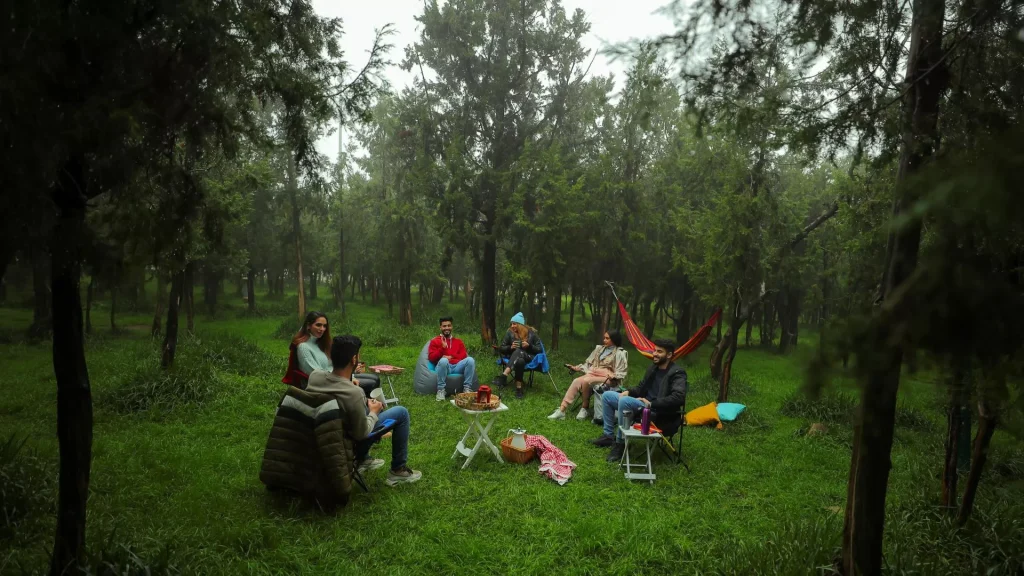Often known for its deserts and religious landmarks, Saudi Arabia also has a diverse natural landscape that nature-lovers can enjoy. In fact, did you know it has lush forests, ancient craters, and vibrant coral reefs? Well, here is a guide to five surprising nature spots in the Kingdom, and how to enjoy them to the fullest.
1. Wahba Crater (Al-Wahbah Crater)

Nestled in the rocky plains around 250km from Taif, Wahba Crater is a volcanic crater 3km wide and 380m deep. Surrounded by the desert, it feels otherworldly, especially as its flat white base glows against the backdrop of basalt cliffs. For visitors there is a digital exhibition hall, lounges, and viewpoints to enjoy.
Must-do activities
Hiking is the most popular activity descending into the crater which can take 45-60 minutes. The return ascent is more challenging and can a couple of hours. The surrounding areas provide excellent camping spots with breathtaking views under the night sky.
Top tip
For a truly unforgettable experience, time your visit to catch the sunrise or sunset over the crater. The colours in the sky paired with the salt flats at the base look ethereal.
Logistics
- Getting there is a four hour drive from Jeddah or a three hour drive from Taif.The road is paved and accessible.
- Bring plenty of water, sturdy shoes and light clothing for the day or warmer layers for cooler desert nights.
2. The Vineyard (Aseer)

Tucked away in the lush highlands of the Aseer region, The Vineyard is a lesser-known yet brilliant natural wonder. This scenic location is famous for its terraces of grapevines, which thrive in the region’s cool, temperate climate. In addition to enjoying fresh local produce, visitors can immerse themselves in the region’s culture and natural beauty between 12 pm and 8 pm every day. The best time to visit is March to October, when the vineyards are looking lush and green.
Must-do activities
Visit local farms and vineyards to learn about the grape-growing traditions and taste locally produced grape juices. Note that alcoholic wine is not available as per Saudi laws. The roads around Aseer also offer spectacular mountain views and terraced farmlands, perfect for leisurely drives or photography.
Top tip
Don’t miss out on the chance to hike through the surrounding Aseer mountains. The trails are quieter than most and give you stunning views of the terraced vineyards below.
Logistics
Wear comfortable walking clothing and sun protection as the area can be quite exposed. To get to the vineyard, fly into Abha, the nearest major city, and it’s about an hours drive.
3. The Coral Reef (Jeddah)

Jeddah’s Red Sea coastline offers some of the world’s most spectacular diving and snorkelling sites. The Great Coral Reef here rivals even the famous reefs of Australia, featuring vibrant coral gardens teeming with marine life, from dolphins to rays. While you can dive at any time of year, the best conditions can be found between October and June.
Must-do activities
Whether you’re a beginner or a seasoned diver, scuba diving is a great way to explore coral formations, shipwrecks, and rich marine biodiversity. Popular diving spots near Jeddah include Abu Tair Reef and Sharm Obhur. For those not keen on diving, snorkelling offers a more accessible way to experience the coral reefs up close.
Top tip
Consider booking a diving trip in the early morning when marine life is most active, and the water visibility is at its best.
Logistics
Jeddah is easily accessible, and most dive centers offer pick-up services. Just make sure to speak to your diving instructors about the right wetsuit type for the activity you’re doing.
4. The Empty Quarter (Rub’ al Khali)

The Empty Quarter is the largest continuous sand desert in the world, stretching across four countries, including Saudi Arabia. Known for its vast sand dunes, this area is not for the faint-hearted but offers the ultimate desert experience. The best time to visit is October to March to avoid the intense summer heat. It’s important to note that those visiting the Empty Quarter from Saudi Arabia will need a permit from the National Commission for Wildlife Conservation and Development.
Must-do activities
One of the most exhilarating ways to explore the Empty Quarter is by dune bashing in a 4WD vehicle, with some dunes over 300m high, it’s not for the faint of heart. For a more serene experience, go on a camel ride and immerse yourself in the quiet expanse of the desert. Spending a night under the stars in the desert is a must. Many tour operators offer luxury campsites complete with traditional Bedouin tents.
Top tips
Book a guided tour to ensure safety and to access hidden gems like natural oases and ancient caravan routes that are scattered throughout the desert.
Logistics
Wear light, breathable clothing during the day and warm layers for the night. Bring sunglasses and a hat to protect against the sun. Tours often start from the city of Sharurah, located on the edge of the Empty Quarter.
5. Raghadan Forest (Al Baha)

A true hidden gem in Saudi Arabia, the Raghadan Forest is a lush oasis in Al Baha’s mountains. Offering cool weather, green forests, and beautiful vistas, the area spans 600,000 sqm and is a stark contrast to Saudi’s traditional deserts. Make sure to check the calendar as the forest holds musical and cultural events throughout the year that are usually suitable for families.
Must-do activities
The forest is equipped with scenic picnic spots, perfect for family outings, but notably, there is a shopping tent right in the middle of nature. For the adrenaline junkies, there are also zip-lining adventures. Nature enthusiasts can enjoy the scenery, especially from the Raghadan Forest Overlook, as well as the colourful waterfalls that light up at night.
Top tip
In the forest, you’ll find an elevated 100m long suspension bridge around 13 – 15m high that offers beautiful views of Aqabat Al Baha and the forest.
Logistics
Al Baha is about 2.5 hours from Abha by car and can be enjoyed year-round.
For nature enthusiasts, Saudi Arabia offers much more than meets the eye. These are just a small selection of options to explore.



